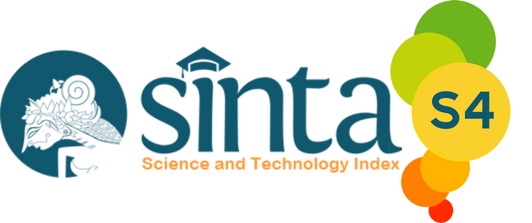STUDI POLA KOMUNIKASI PEMERINTAH DAN PESANTREN DALAM PENGEMBANGAN MASYARAKAT
Abstract
Historical development of boarding school itself can not be separated from the history of the development of Islam in the archipelago. Even genealogy boarding school education system can be traced from the time before the advent of Islam in Indonesia. Along with the development program in Indonesia, with the character of independence, Pondok Pesantren experiencing rapid development. Pondok Pesantren is not only incarnated as an educational institution of the people, but also as agents of change and community development. With the enactment of Law No. 20 of 2003 on National Education System, Boarding School entered a new phase in the world of education in this country, Pondok Pesantren has entered an integral part in the national education system. If all this has been donating all its schools for the benefit of citizens (state), then there must be a symbiotic mutualism between the two. It's time the state (government) pay serious attention to the continuity of boarding. If all this can exist with non-boarding schools, then the existence will be maximized if it is supported by the state. Moreover, the challenges ahead are certainly more severe because the social dynamics are also increasingly complex. Therefore, the necessary revitalization of the relationship between schools and the government during this flow. Pesantren has thus become and always become "a pioneer or pioneer development in Indonesia. Of course this should be accompanied with awareness building attitude and professional behavior.
Keywords
Full Text:
PDFReferences
A. Halim, Rr. Suhartini, M. ChoirulArif, A. Sunarto (eds) (Juli 2005). Manajemen Pesantren. Yogyakarta: Pustaka Pesantren, Cet. I.
Arief, Sritua. (1998). Pembangunanisme dan Ekonomi Indonesia. Bandung: Zaman Wacana Mulia.
Ballling dan Totten, (1985). Modernisasi Masalah Model Pembangunan, Jakarta : Rajawali Press, 1985, cet II
Dhofier, Zamakhsyari. Tradisi Pesantren Studi Tentang Pandangan Hidup Kyai. Jakarta: LP3ES, 1982.
Dodi Nandika,”Pesantren Sebagai Basis Pembangunan Wilayah”, dalam Republika, Jum’at, 25 Februari 2005.
Effendi, Tadjudin Noer. (1998). Sumber Daya Manusia Peluang Kerja dan Kemiskinan. Yogyakarta: Tiara Wacana.
Field, John (Maret 2010). Modal Sosial. Bantul: Kreasi Wacana, Cet. I.
Fisher, B. Aubrey. (1986). Teori-Teori Komunikasi. Bandung: Remaja Rosdakarya.
H.J. de Graaf dan Th. G. Th. Pigeaud. Kerajaan-Kerajaan Islam Pertama di Jawa Kajian Sejarah Politik Abad ke-15 dan ke-16. Jakarta: Grafiti Press, 1986.
Hamka, (1981). Sejarah Umat Islam. Jakarta: Bulan Bintang, Cet. IV.
Jim Ife dan Frank Tesoriero. (September 2008). Community Development: Alternatif Pengembangan Masyarakat di Era Globalisasi. Yogyakar- ta: Pustaka Pelajar, Cet. I.
Karim, M. Rusli. Dinamika Islam di Indonesia Suatu Tinjauan Sosial Politik. Yogyakarta: Hanindita, 1985.
Korten, David C. (1989). Getting to The 21st Century Voluntary Action and the Global Agenda. Connecticut, USA: Kumarian Press, Inc.
Litlejohn, Stephen W. & Karen A. Foss. (2008). Theories of Human Communication. Belmot, USA: Pre-Press Company, Inc, Ninth Edition.
Mardikanto, Totok. (1997). Dasar- dasar Komunikasi Pembangunan. Jakarta: Balai Pustaka, Cet I.
Midgley, James. (2005). Pembangunan Sosial: Perpektif Pembangunan Dalam Kesejahteraan Sosial. Jakarta: Ditperta Depag RI.
Nasution, Z. 2004. Komunikasi Pembangunan. Pengenalan Teori dan Penerapannya. Rajawali Pers. Jakarta.
Panitia PM Gontor. K.H. Imam Zarkazy Dari Gontor Merintis Pesantren Modern. Ponorogo: Gontor Press, 1996. Pembangunan Indonesia : Menyongsong Abad XXI. Pustaka Pembangunan Swadaya Nusantara. Jakarta.
Rogers, E. M (Ed). 1989, Komunikasi dan Pembangunan: Perspektif Kritis. LP3S. Jakarta.
Rogers, E. M. 2003, Diffusion of Innovations: Fifth Edition. Free Press. New York.
Rovihandono, Rio, dkk (Januari 2006). Merekam jejak Mitra Pengelolaan Sumber Daya Alam Berbasis Masyarakat. Jakarta: Yayasan Keanekaragaman Hayati Indonesia, Cet. I.
Suman, Agus dan Ahmad Erani Yustika. (1997). Perspektif Baru Pembangunan Indonesia catatan Kritis terhadap Isu-Isu Aktual, Malang: Brawijaya Press, cet. I.
Suwarsono & Alvin Y. So (1991), Perubahan Sosial dan Pembangunan di Indonesia- Teori-teori Modernisasi, Dependensi dan Sistem Dunia, Jakarta: LP3ES, Cet. 1 (Selasa, 2 Nopember 2010).
Tilaar, H.A.R, (1997), Pengembangan Sumber Daya Manusia Dalam Era Globalisasi. Jakarta: Gramedia.
Yaya M. Abdul Aziz (ed.),”Visi Global Antisipasi Indonesia Memasuki Abad Ke 21, Jakarta: Yayasan Islam Abad 21, cet I.
Yustina, Ida dan Sudrajat, Adjat (Penyt.), 2003, Membentuk Pola Perilaku Manusia Pembangunan : Didedikasikan Kepada Prof. Dr. H.R. Margono Slamet, IPB Press : Bogor.
Zarkasyi, Imam dan Ahmad Sahal. Wasiat, Pesan, Nasehat dan Harapan Pendiri Pondok Modern Gontor. Ponorogo: Pondok Modern Gontor.
Ziemek, Manfred. (September 1986). Pesantren Dalam Perubahan Sosial. Jakarta: Perhimpunan Pengembangan Pesantren dan Masyarakat, Cet. I.
Zubeidi.2007.Pemberdayaan Masya- rakat Berbasis Pesantren. Yogyakarta: Pustaka Pelajar, Cet I.
Refbacks
- There are currently no refbacks.






